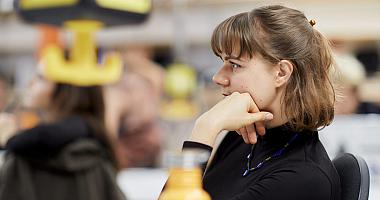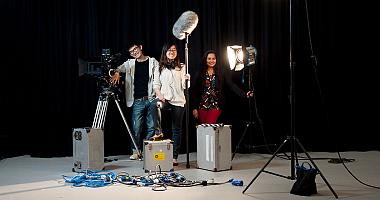MA
Artists' Film & Moving Image
Content navigation menu
Why study MA Artists' Film & Moving Image at Goldsmiths
This 12-month, intensively taught practice-based Masters is aimed at artists and graduates working within the field of artists’ film and moving image who wish to develop their practice and professional networks with the support of Goldsmiths' Art Department and its uniquely high concentration of accomplished artist filmmakers.
- The programme is centred on the individual experience and knowledge that each student brings, developing them as artists who want to innovate in the expanding field of moving image.
- Students are challenged to synthesise the knowledge and understanding gained from its bespoke curriculum linking practice, theory and professional development into a reflective, informed and decisive approach to the intellectual, aesthetic, social and technical processes necessary to bring their individual artistic project in moving image or related media from idea to realisation.
- The curriculum provides an integration of discursive and practical teaching and learning methods, facilitated by Goldsmiths staff and visiting lecturers. A lecture series addressing the histories, contexts and futures of artists’ moving image is complemented by practice-oriented seminars, workshops and masterclasses which offer in-depth explorations of individual practices, movements and strategies.
- A principal concern that spans across the programme is a sustained consideration of the material display and discursive reception of artists' film and moving image within a gallery context and the agency of a pluralistic moving image in relation to the fixed plane of the cinematic or networked screen.
- Benefitting from its location in London and strong affiliation with professional bodies and institutions, the Masters emphasises professional development through bespoke mentoring and workshops led by leading professionals and study visits to film festivals, exhibitions and institutions.
Contact the department
If you have specific questions about the degree, contact the Programme Director, Gail Pickering.
Length
1 year full-time, or 2 years part-time
Fees
Home - full-time: £13600
Home - part-time: £6800
International - full-time: £24350
Department
Watch videos about the programme
What you'll study
The MA Artists’ Film & Moving Image programme is one full-time calendar year. We also have a two-year part-time option available to UK students (there are limited part-time spaces available). For more information contact please email the programme convenor.
Students accepted onto the programme will already have outlined their key interests in their project proposal. It is from this starting point that you will be supported in developing your project through various teaching modes,which continue across the three terms of the programme. These include:
- Tutorials
- Seminar presentations
- Research skills training
- Workshops
- Mentoring
- Masterclasses with relevant professionals
Teaching is largely made up of:
- Student-centred learning
- Guided independent research
- Studio practice
This takes place across the Autumn, Spring and Summer terms, leading to a final degree exhibition in July.
The remainder of the summer is meant for completion of the dissertation, which is submitted at the end of August.
Assessment
Students will be assessed by project presentations leading to three examination elements:
- Research Portfolio
- Final Degree Exhibition
- Dissertation
All three elements must be passed to successfully complete the programme.
Facilities
The postgraduate studios are a short walk from the art practice areas in New Cross. You may also choose to travel by bus between the two sites, which would incur a small travel cost.
Students studying on this programme are based in a dedicated postgraduate studio spaces on the main campus in New Cross, where you can access all of the Department of Art’s facilities, including all the art practice areas: Graphics and Time-based Media, Photography, Sculpture 3D Print, Casting, Ceramics, Metal, Woodwork, Fine Art Print, Constructed Textiles, Print and Dye.
The Artists’ Moving Image Research Studio is a space for production, screening and also houses our own programme dedicated equipment including 16mm and digital cameras, audio and lighting equipment.
Careers
The MA Artists’ Film & Moving Image is designed to provide you with an understanding and experience of artists’ moving image practice that has a breadth of outcomes and a variety of transferable skills in the knowledge that the professional field demands creative and practical flexibility.
Students completing the programme should be able to establish themselves as practitioners of significance in the field of contemporary art, film and moving image and related professions, including: independent artist filmmakers, academics, teachers, curators, writers, critics, as well as institutional and independent innovators.
The Department of Art has a long and continuing record of alumni establishing professional careers and achieving considerable success in the field, including nominations to and winners of the Derek Jarman Award, the Turner Prize and the Oscars, alongside and in addition to alumni who show their work internationally at museums, public and commercial galleries, as well as on national television, international film festivals and biennales.
Professional network
Throughout the duration of the programme you will be introduced to and work alongside leading professionals from within the field of artists’ film, through workshops, seminars and one-to-one meetings.
This will contribute to your establishing your own professional network, as well as providing significant experience and understanding of the processes of production, display and distribution of artists’ film and moving image.
Entry requirements
You should normally have (or expect to be awarded) the following qualifications:
- An undergraduate degree of at least upper second class standard with a substantial fine art, film or moving image component
or - Demonstrable establised creative practice appropriate to to qualify for entry
Consideration will be given if you do not have an academic background but can demonstrate professional experience in this area and can show that you have the ability to work and study at postgraduate level.
The programme draws applicants from around the world with diverse cultural backgrounds and experiences. We actively encourage these applications as well as those from mature learners who wish to broaden their creative knowledge base.
International qualifications
We accept a wide range of international qualifications. Find out more about the qualifications we accept from around the world.
If English isn’t your first language, you will need an IELTS score (or equivalent English language qualification) of 6.5 with a 6.5 in writing and no element lower than 6.0 to study this programme. If you need assistance with your English language, we offer a range of courses that can help prepare you for postgraduate study.
Fees and funding
Annual tuition fees
These are the PG fees for students starting their programme in the 2025/2026 academic year.
- Home - full-time: £13600
- Home - part-time: £6800
- International - full-time: £24350
If your fees are not listed here, please check our postgraduate fees guidance or contact the Fees Office, who can also advise you about how to pay your fees.
It’s not currently possible for international students to study part-time under a student visa. If you think you might be eligible to study part-time while being on another visa type, please contact our Admissions Team for more information.
If you are looking to pay your fees please see our guide to making a payment.
Funding opportunities
Explore the Goldsmiths scholarships finder to find out what funding you may be eligible for.
If you are a UK student you may be eligible for a postgraduate loan.
Meanwhile our Careers Service can also offer advice on finding work during your studies.
Paying your fees
Find out about paying your tuition fees.
Additional costs
In addition to your tuition fees, you'll be responsible for any additional costs associated with your course, such as buying stationery and paying for photocopying. You can find out more about what you need to budget for on our study costs page.
There may also be specific additional costs associated with your programme. This can include things like paying for field trips or specialist materials for your assignments. Please check the programme specification for more information.
How to apply
You apply directly to Goldsmiths using our online application system.
Before submitting your application you’ll need to have:
- Project proposal: You must apply with a developed idea for a moving image project (as this is understood in a fine art context). It should be a 500-word proposal in which you provide an overview of the ideas, context, methods, and anticipated outcome (eg a body of work, single work). It should also indicate the key interests and motivations for your practice-based research, and provide an example of any preparatory material you might have already produced.
- Personal statement: You should outline your previous experience and motivations for joining the programme, and how you expect to contribute to and gain from it. Read our guidance on writing a postgraduate statement.
- Portfolio: This should preferably be a single PDF document that includes information on the media, duration, year of production and description if appropriate, as well as a list of links to works on Vimeo, YouTube or equivalent, with passwords if required. Ensure you prioritise the work and/or extracts you want us to see, as we will view a maximum of 15 minutes total running time.
- CV: Please include details of your education history and any relevant experience.
- The email address of your referee who we can request a reference from, or alternatively a copy of your academic reference.
- Copies of your educational transcripts or certificates.
You'll be able to save your progress at any point and return to your application by logging in using your username/email and password.
When to apply
We have two application deadlines: January and April.
Deadline: 30 January
Interviews will be held during February to March.
Candidates will be informed of the outcome of their application by the end of March.
Deadline: 30 April
Interviews will be held during May to June.
Candidates will be informed of the outcome of their application by the end of June.
Applications received after the April closing date will only be considered if there are spaces available and only up until the end of June.
International candidates who require an IELTS certificate are encouraged to have this in place in advance of making an application.
We encourage you to complete your application as early as possible, even if you haven't finished your current programme of study. It's very common to be offered a place that is conditional on you achieving a particular qualification.
Further guidance
Read our guide to applying for a postgraduate degree at Goldsmiths.
Top image credit: Sam Risley, ‘Coppice’, 2022, single-channel 4K video projection; screen made from fallen cedar; alder viewing bench made from alder that fell from natural causes during Storm Eunice; stereo sound, 35mins. Installation view at Goldsmiths’ University of London.






